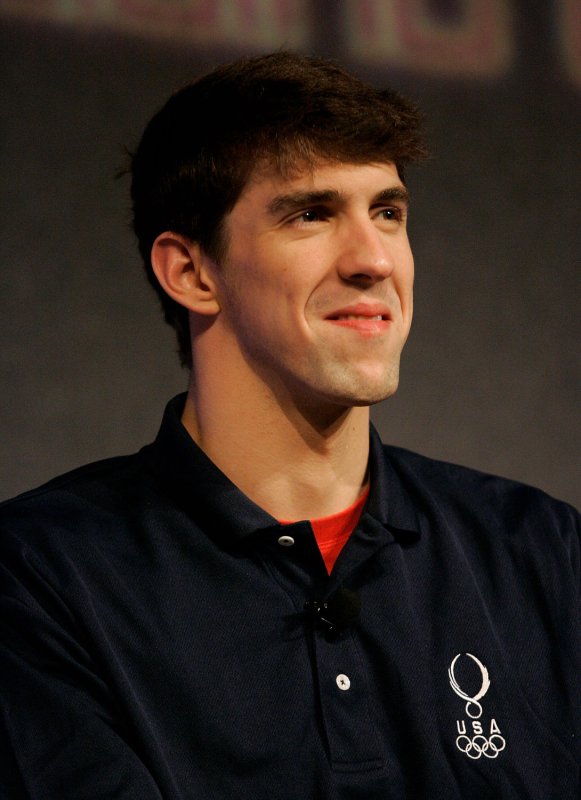1 of 5 | Swimmer Michael Phelps smiles during a news conference at the 2008 U.S. Olympic Team Media Summit on April 14, 2008. (UPI Photo/Brian Kersey) |
License Photo
BEIJING, July 18 (UPI) -- At 10:55 a.m. on the third Sunday in August, if all has gone well to that point, Michael Phelps will have his date with history.
Having established himself as the best swimmer on the planet, at the age of 23 Phelps can also establish himself as the most prolific winner there has ever been in the Olympics.
He will need help to do it. But the feat he hopes to achieve is entirely within the realm of possibility and his quest will easily be the athletic centerpiece as the 2008 Games unfold in Beijing.
"Based on what I've seen, I'd say he has a great chance of doing it," said Mark Spitz, who owns the most glamorous of the records Phelps might break during his stay in China. "It's certainly great for the Olympic movement."
Going into the 1972 Games in Munich, the record for most gold medals won in a single Olympics was five. Spitz won seven that year -- capturing the 100- and 200-meter freestyle, the 100- and 200-meter butterfly and swimming on three winning American relay teams. A world record was established in every event.
The standard Spitz set 36 years ago remains unbroken. At least it will be until Aug. 17, the final day of Olympic swimming. It is then that Phelps, should things fall into place, will have a chance to win his eighth gold medal in Beijing.
Phelps, a 6-4 native of Baltimore and former student at the University of Michigan, will swim in the 100 and 200 butterfly, 200 freestyle and the 200 and 400 individual medley. He will also take part in the three Olympic relays -- the 400 freestyle, 800 freestyle and 400 medley.
He owns the world record in four of the five individual events in which he will compete. The only one he does hold the record in is the 100 butterfly and Phelps defeated the man who does have the record (Ian Crocker) by nearly three-quarters of a second at the recent U.S. Olympic trials.
Thanks to the influence brought about by all the money pumped into the Olympic movement by American television, Phelps' efforts will be seen in prime time in his native country.
Two years ago, it was announced that the various preliminary heats in the Olympic swimming competition would be during the evenings in Beijing and the finals would take place in the mornings. It is usually the other way around.
The first of Phelps' finals, for instance, will take place at 10:39 a.m. Aug. 10 (the 400 individual medley). Since Beijing is 12 hours ahead of the eastern time zone in the United States, the gun for Phelps' first final will sound at 10:39 p.m. Saturday up and down the U.S. East Coast.
That is the way it will be throughout the week of swimming as the potential drama builds. The biggest drama of all might come in the relays, where other competitors must do their job for Phelps to succeed.
Phelps had a chance for eight gold medals as well at last year's World Championships, but when Crocker left the blocks 0.01 of a second too soon during the 400 medley relay, the American team was disqualified.
The record for most gold medals in a single Olympics is not the only mark Phelps will be trying to break in Beijing.
Spitz, track stars Paavo Nurmi and Carl Lewis and gymnastics icon Larysa Latynina share the record for most gold medals in a career with nine. Phelps already has six, gathered in Athens four years ago. He could push that total to 14 -- shattering the Olympic mark.
The record for most gold medals in individual events is eight and it has stood since 1908. American Raymond Ewry won both the standing long jump and standing high jump in four straight Olympics. Those events have not been contested since 1912.
Phelps could finish the upcoming Games with nine individual gold medals in his career, thus eclipsing Ewry from the record book.
Finally, Phelps could close out these Olympics with 16 overall medals over the past two Games. He won eight in Athens, taking home two bronze medals in addition to his six gold.
If Phelps does reach 16 medals for his Olympic career, it would be the most ever won by a male athlete. The overall record of 18, held by Latynina, is out of Phelps' reach.
At least it is out of reach during the 2008 Olympics. If Phelps wants to set records that would be almost impossible to break, he could train for four more years, go to London in 2012 and do it all over again.















